Best WordPress Alternatives: 12 Great Options Compared
WordPress is a content management system (CMS) capable of creating just about anything: a blog, a portfolio, or even a business website. Since it's so versatile, the platform's difficulty depends on your skill level as well as the complexity of your project.
WordPress absolutely dominates the market, accounting for nearly 75% of websites whose CMS we could identify. So, what are the alternatives?
Even though it's extremely popular for a number of valid reasons, WordPress isn't perfect. Before introducing you to some of the available alternatives, we'll highlight a few of WordPress's disadvantages.
Disadvantages of Using WordPress
WordPress might not be the ideal solution for your Web project for any of these reasons:
Complexity
For a simple project, WordPress is probably overkill. Even though the CMS is known for its ease of use, and doesn't require any coding knowledge, there are plenty of solutions that make creating a website even simpler.Problematic plugins and extensions
The number and variety of plugins WordPress offers are usually seen as two of its advantages. However, extensions might have issues on your website and/or be incompatible with one another.Security gaps
WordPress isn't just popular with website operators, but also with hackers. Since the CMS is so common, many cyber criminals look for exploits on it in order to attack websites.Programming knowledge is not necessary but extremely useful
Basic WordPress features are accessible to users of any experience level, however, to harness the platform's full potential, you'll need to be familiar with coding.Spam magnet
Unfortunately, spam is part of the Internet. If you've enabled comments or published contact details on your WordPress website, it won't take long to realize that spammers are drawn to the CMS like bees are to honey.You handle backups, security, and other aspects
Unlike the case with most of the alternatives, WordPress users need to take care of a number of aspects on their own, such as their website's security and backups.No support
Support that will walk you through issues you might be having isn't offered for WordPress's CMS. You can get help with some themes and plugins though.
Don't get us wrong: WordPress is a powerful CMS capable of realizing nearly any sort of Web project, however, it isn't the be-all and end-all.
12 WordPress Alternatives
Deciding which alternatives to WordPress are right for you and your business depends on what kind of project it is you're trying to realize, as well as the type of website that you have in mind. While WordPress can do just about anything, other solutions are geared towards specific niches, making them better suited for those undertakings.
Our 12 alternatives are grouped into four categories: Site builders, self-hosted CMSs, ecommerce solutions, and blogging platforms.
Website Builders
Site builders are extremely popular since they don't require any programming knowledge. So long as you have something of an eye for design (and even that isn't necessary), they allow anyone to create almost any kind of sleek website. The secret is in their editors, with which users can build a website visually and edit it in a frontend similar environment.
There are lots of site builders on the market. Below, we've listed three that we consider among the best:
Wix: The Best Site-Building All-Arounder

What WordPress is to CMS, Wix is to site building, being one of the most popular solutions on the market. And little wonder, as its nifty drag and drop editor prioritizes user-friendliness, making the platform far easier to use than WordPress.

Wix is probably the best all-around site builder.
The basic version of Wix is free, however, be aware that you'll need to put up with ads, storage limits, as well as a Wix subdomain. Paid, ad-free subscriptions that include a unique domain start at $16 per month.
Wix's Advantages and Disadvantages
Free basic package; relatively affordable premium version
Easy to use; no programming knowledge necessary
Lots of design templates
Fast and safe hosting on Wix servers
The best paid subscriptions are fairly expensive
Ads with the free version and least expensive paid subscription
Not possible to easily change templates like in WordPress
Squarespace: Sleek Designs, Easy to Use

If you regularly listen to podcasts or watch YouTube, chances are that you've already heard of Squarespace, since their marketing team seems to sponsor just about every content creator.
But, this isn't all just a gimmick: Squarespace really does make setting up a website child's play. WIth it, you won't need to give a second thought to things like hosting or a domain either. To get started, just create an account, select a subscription, and you'll be good to go.

Squarespace is particularly known for the quality of its templates.
Squarespace's pricing structure is straightforward: A personal website costs just $16 a month if paying yearly, while a business website will set you back $23 a month. You can open an online store with the Commerce Basic package for $27 a month.
Squarespace's Advantages and Disadvantages
Plenty of stunning design templates
Fast and secure hosting included in the subscription price
All-in-one platform; guarantees that everything works
Pricier than its competitors
Lacks some marketing tools and features
No apps or extensions owing to the all-in-one concept
By the way: If you can't make up your mind about which of our two leading site builders is best for you, check out our Wix vs. Squarespace comparison for more details.
Weebly: Simple Site Builder With a Great Mobile App

Weebly is our third alternative to WordPress and works similarly to the two site builders above. With its intuitive drag and drop editor and a nice selection of templates, you'll be able to quickly and easily create your own website. We particularly liked its smartphone app, which you can use to build anywhere when on the go.
Unfortunately, you won't be able to unleash as much creativity with Weebly as with some other site builders: Its drag and drop isn't as free as Wix's, somewhat limiting your customization options. But that platform does score thanks to its powerful ecommerce features.
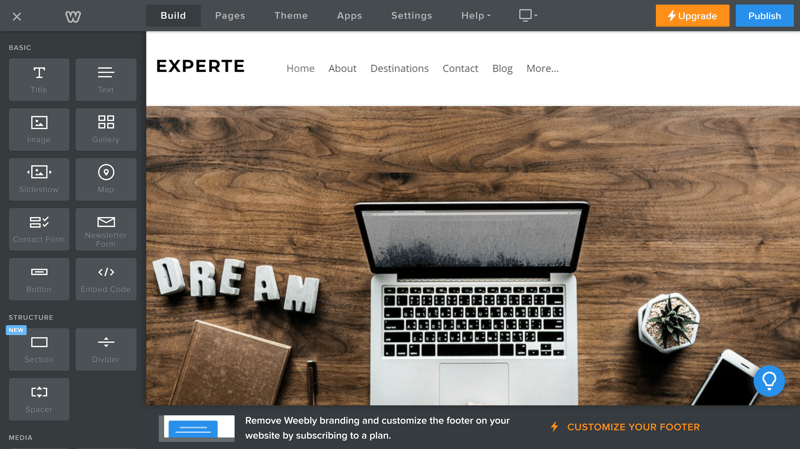
If you'd like to build your website on the go, Weebly is a good option.
The platform's free version ties websites to a Weebly.com subdomain, includes ads, and comes with a number of other limitations.
Premium subscriptions for personal, organizational, or business use are available. The Professional subscription, which is ad-free and includes a custom domain costs $12 per month (billed annually), while the Performance plan, which includes advanced ecommerce features, will set you back $26 a month.
Weebly's Advantages and Disadvantages
User-friendly and intuitive; great for beginners
Secure and fast hosting
Free basic version, flexible pricing
Integrated ecommerce features
Little customization possible
Tied to Weebly, no software installation
Limited blogging features
Self-Hosted CMS
Website builders revolutionized the Internet, removing most of the barriers to creating a Web presence. While great for those who don't want to worry about HTML, CSS, or the like, they do impose some limitations. Self-hosted CMSs, on the other hand, provide a useful WordPress alternative that grants their users maximum freedom.
Drupal
Drupal is an open-source CMS that's great for creating blogs, websites, and even social networks. The CMS is particularly geared towards experienced developers who want to build more intricate Web projects.
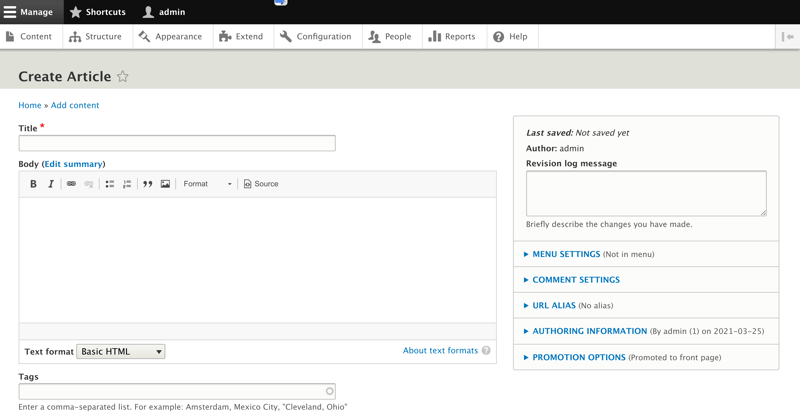
Drupal is a great solution for experienced designers who want to build something unique.
Drupal is free, and you won't need to pay any licensing or usage fees. Of course, there will be other costs, such as those for hosting and a domain.
Drupal's Advantages and Disadvantages
Versatile, expandable, and perfectly suited for complex Web projects
Open source and free
Developer-friendly
Only an option for experienced developers
Difficult to install
Most modules (plugins) are paid
Joomla
Joomla is a dynamic, open-source CMS that also enjoys quite a bit of popularity. Both seen as more versatile than WordPress and easier to use than Drupal, it is the go-to solution among less experienced developers.
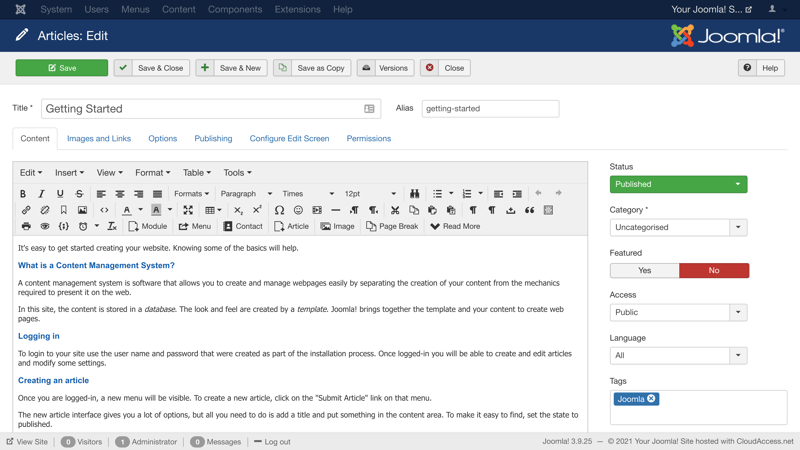
Like many CMSs, Joomla is open source and available for free.
Joomla is also free to use with no licensing or usage fees. Like Drupal, you will have to pay to get your website up and running though. Among other things, costs include premium extensions and plugins.
Joomla's Advantages and Disadvantages
Good compromise between WordPress and Drupal
Detailed, but user-friendly interface
Multi-lingual platform
Advanced programming knowledge not necessary
More complicated than WordPress; steep learning curve
Underdeveloped third-party marketplace
Less balanced than WordPress or Drupal
Contentful: Headless CMS for Flexible Content Output on Different Media
Perhaps the biggest trend in CMS recently has been "headless" content management. These CMSs separate backend features (such as content creation and management) from the front end (how content is presented). Once created, this allows content to be better and more easily output on a wide range of different channels.
Contentful is one of the most popular headless CMSs. With it, you'll define content elements and page types, thereafter filling them with content that can be displayed in a variety of different ways. Once this basic framework has been created, no further development work is needed to display content across any number of mediums or channels.

Contentful is one of the most popular headless CMSs.
Contentful offers a free Community package, which is really only designed for small projects and testing the platform. Its Team subscription costs at least $489 per year, which works out to just over $40 per month - definitely not one of the more affordable options on this list.
Maximum flexibility in terms of content output
Considerably eases content management for large websites
Little development work needed after initial configuration
Fairly expensive
Very complicated, especially when getting started
Ecommerce Solutions
Most websites exist to sell something, whether it's an idea, a service, or a physical product. WordPress does offer ecommerce features and add-ons like WooCommerce, however, there also exist CMSs that specialize in this area. Any one of these would likely be preferable if you're looking to set up an online store.
Shopify: User-Friendly Ecommerce Builder


Shopify is a beginner-friendly ecommerce store builder.
Three Shopify subscriptions are available: Basic Shopify, Shopify, and Advanced Shopify. These differ mostly in terms of the number of personal accounts, features, and transaction fees. The last of these are only incurred if you use an external payment gateway: None are charged with Shopify Payments.
Shopify's Advantages and Disadvantages
Easy to use; no programming knowledge required
Large selection of themes
Numerous apps and plugins
Good, round-the-clock support
Ease of use at the cost of features and customization options
Only a handful of free templates
Paid apps
BigCommerce: Online Stores Without Transaction Fees or Product Limits

BigCommerce* is another ecommerce builder that includes hosting and a drag and drop editor that can be used by anyone, even without a lick of coding experience. Setting up an online store with the platform is a piece of cake too, making it easy to offer and sell as many products as you'd like.
Multiple payment methods including PayPal, Amazon, and Apple Pay are supported, along with third-party apps and extensions.

With BigCommerce you can sell as many products online as you want.
Four different subscription packages are offered: Standard, Plus, Pro, and Enterprise. Each differs in terms of the number of shops and features that are available, however, none include transaction fees.
BigCommerce's Advantages and Disadvantages
Intuitive to use; equally suited for beginners and pros
No transaction fees
99.99% availability guarantee and high security
Embedded blogging platform
Expensive premium plans
As you store grows, so do the fees
Few free themes; pricey premium options (around $200)
Magento: Ecommerce for Pros
Adobe's Magento is an ecommerce solution for business owners with some programming experience. The open-source platform allows for stores to be customized to your preferences but is much more intricate and versatile than competitors like Shopify or BigCommerce.
Thanks to its marketing tools, you can keep tabs on all of your sales, while the handy add-ons make it possible to fully customize your digital store.
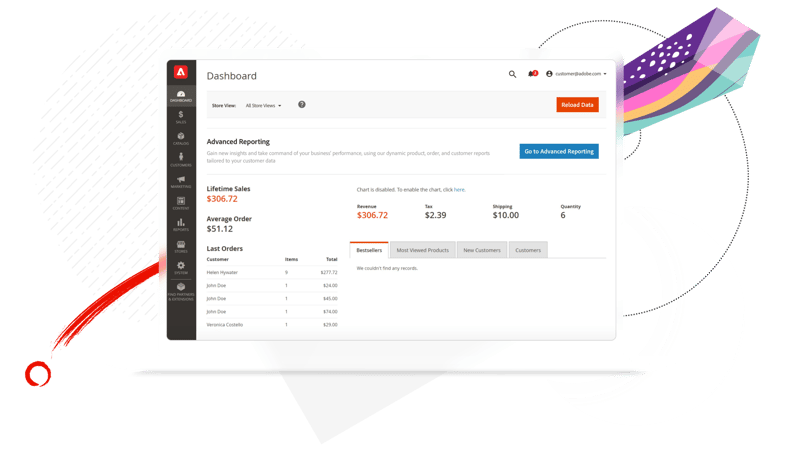
Adobe Magento is significantly more complicated than other ecommerce builders, but also more versatile.
How much you'll pay for Magento depends on the size of your store and your needs. With that said, compared to shop builders, the open-source solution is definitely more expensive.
Magento's Advantages and Disadvantages
Flexible, powerful, and loaded with features
Large and helpful user community
Good tools for optimizing performance on mobile devices
Unclear pricing structure; expensive premium packages
Not for beginners or those lacking programming knowledge
Magento programmers are few and far between
Blogging Platforms
Believe it or not, before WordPress dominated the market, it began life as blogging software. Following its rise in popularity, it did leave something of a gap, with a number of smaller services emerging in its wake.
Ghost: Feature-Heavy CMS Geared Towards Blogging
Ghost, a crowdfunded CMS is particularly well-suited for bloggers, journalists, and editors - in other words: anyone who needs a text-based website.
The platform is nowhere near as complex or flexible as WordPress, however, that's by design, since it allows anyone to create an elegant and easy-to-manage website.
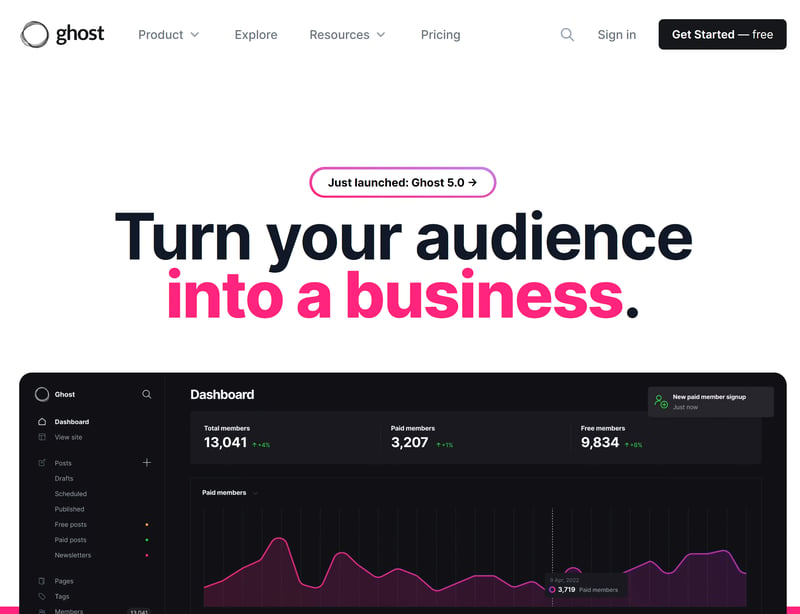
Ghost is a CMS that's focused on blogging.
Ghost's costs are linked to your blog's success: The more readers (or "members") it has, the more you'll be charged. Rates start at $9 (up to 500 members) and increase from there. Beyond that, a number of different rates are offered which vary in terms of the features they include (such as additional templates, or support).
Ghost's Advantages and Disadvantages
CMS geared towards blogging
Includes plenty of useful blog features (memberships, newsletters, etc.)
Sleek dashboard; clear design
Powerful SEO features
Pricier than other solutions
Medium: Create a Digital Newspaper
Medium continues to enjoy widespread popularity as a blogging platform that helps authors to reach millions of readers. Of course, comparing WordPress to Medium is difficult. Whereas WordPress is a fully functional CMS that offers nearly endless possibilities, Medium is a blogging platform that's geared towards text-based sites. All the same, supposing that you don't need more, setting up your website using Medium could spare you quite a few headaches.
Medium is a publishing platform on which authors can make their content available, tag it, and follow other bloggers. In this way, anyone can create their own digital newspaper.
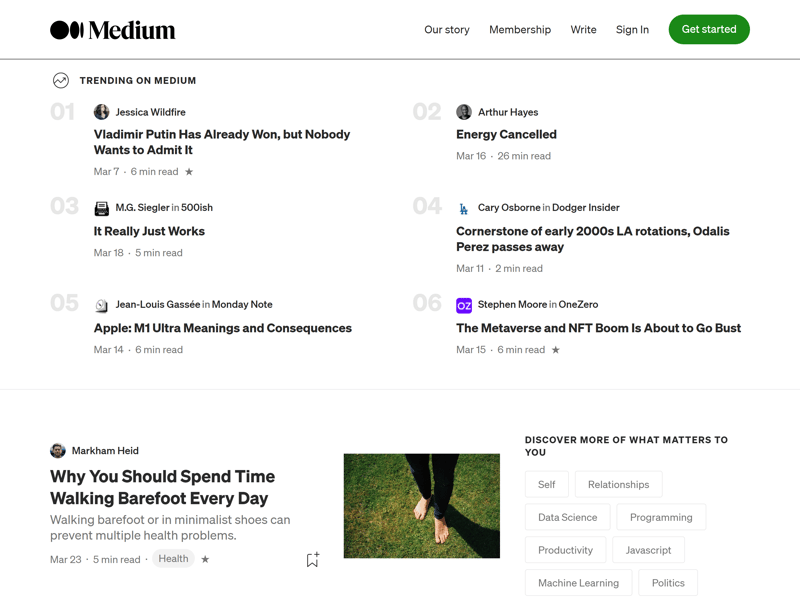
Anyone can start their own blog on Medium.
Medium is free, however, for $5 per month, or $50 per year, you'll get unlimited access. This allows you to read as much content as you like, listen to audio versions of articles, as well as take advantage of a few other features.
Medium's Advantages and Disadvantages
Lean blogging platform
Possible to earn money through blog entries
Reach a wide(r) audience
Not really a substitute for a dedicated website
Impossible to integrate ads
Limited features
Blogger: No Frills Blogging Platform
Blogger is a simple, free, and reliable service offered by Google that's geared towards one thing: Blogging. In contrast to WordPress, Blogger is not a CMS. Still, anyone who just wants to get their texts online in as user-friendly a way as possible, and doesn't need too many features, will likely be pleased with the service. All you'll need to get started is a Google account.

If you just want to get your ideas online, Blogger is a good option.
Blogger and its domain, Blogspot, are completely free.
Blogger's Advantages and Disadvantages
Solely focused on blogging
Easy to handle
Google integrations make it even easier to use (and allow monetization via AdSense!)
Strictly limited to blogging
No homepage or landing pages
Few customization options
Conclusion: WordPress Is One of a Kind
All it takes is a quick look at WordPress's competitors to see that it's a true all-arounder. Still, depending on what it is that you intend to accomplish, the all-in-one CMS might not be the best solution: Depending on your programming experience, the type of project you're looking at, and what sort of compromises you're willing to make, there are a number of good alternatives.
In our website & ecommerce center, you'll find plenty of information about how to set up your own website, as well as what the best site builders are.













